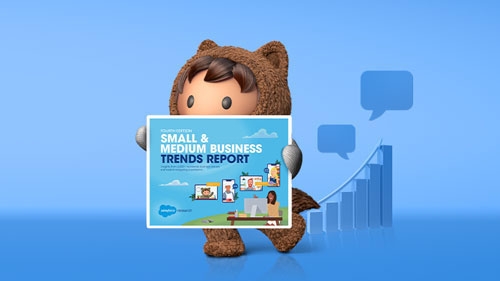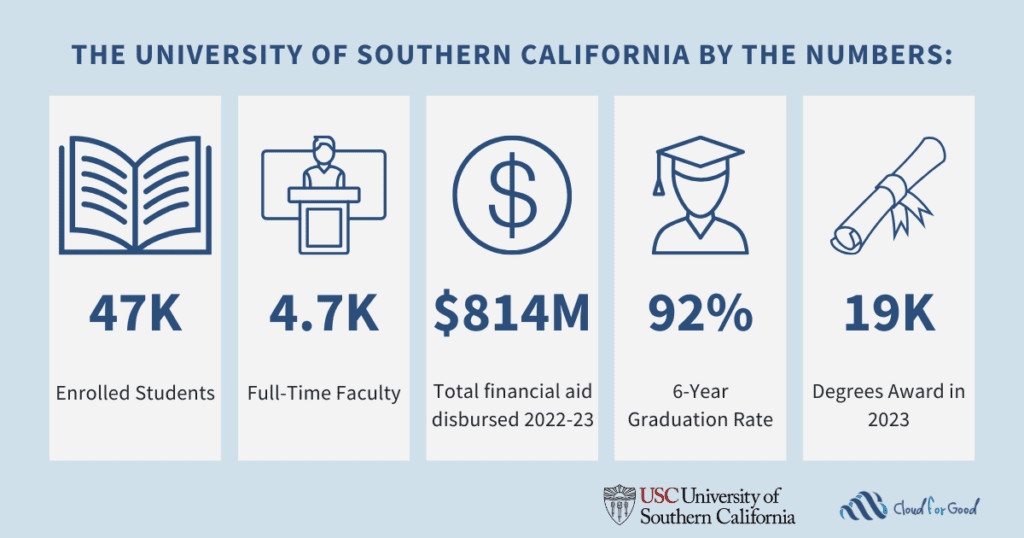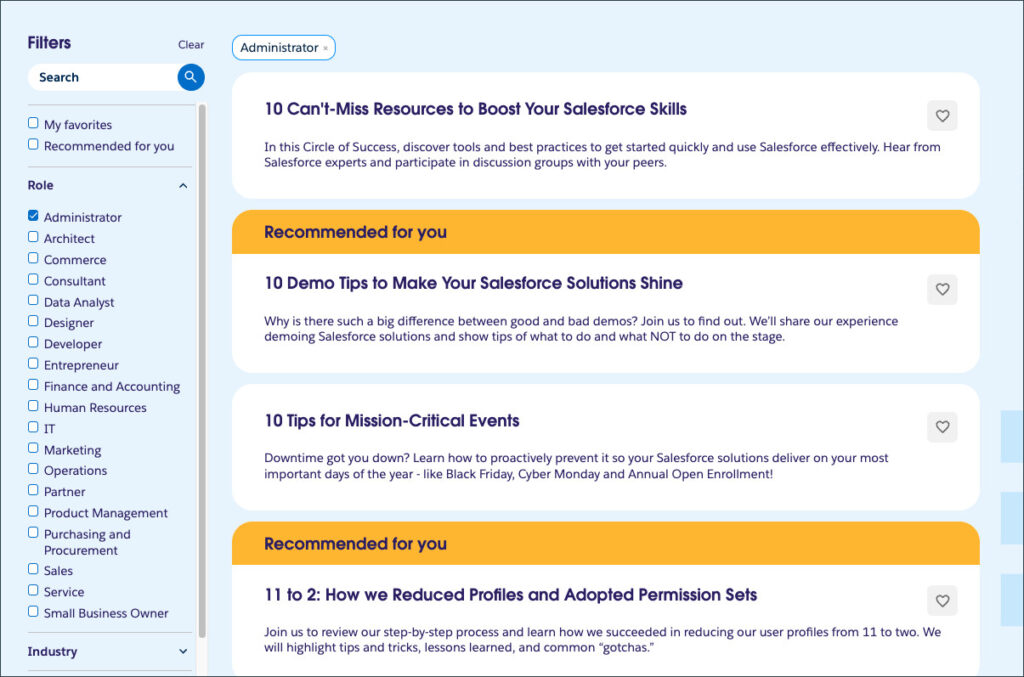Do you feel like your startup has untapped potential? You’re not alone. Many small or medium-sized business (SMB) owners reach a point where they’ve built something valuable but need an extra push to reach the next level. This is where business accelerators come in – specialized programs designed to help promising businesses scale rapidly and efficiently.
Business accelerators have transformed countless SMBs into industry leaders by providing a unique blend of mentorship, resources, and connections. For SMBs, accelerators offer structured support that addresses common growth challenges while opening doors to new opportunities that might otherwise remain closed.
What we’ll cover
- What is a business accelerator?
- Why business accelerators matter
- How business accelerators work
- Key features of business accelerators
- How to apply for an accelerator
- Is it right for your business?
- Examples of successful accelerators
- How AI and CRM are playing a role
- Accelerating your business success in the digital age
What is a business accelerator?
A business accelerator is a structured program that helps early-stage companies grow fast. It’s like a boot camp for your business, packing months or even years of learning into just a few weeks.
The goal is to help fine-tune your business model, improve your product with expert feedback, and prepare you to pitch to investors. Unlike traditional business development approaches, accelerators focus on rapid transformation, pushing businesses to evolve quickly through intense mentorship and practical application.
Start with SMB Basics
Why business accelerators matter
Business accelerators offer practical advantages that address common challenges SMB owners face. They provide structure, connections, and expertise that can help streamline your growth journey. Here are four key ways accelerators create value for businesses like yours:
Accelerate growth: As the name suggests, accelerators are built to speed things up. These programs provide structured guidance and eliminate common obstacles, helping you reach key milestones much sooner than usual.
Expertise access: Accelerators connect you with seasoned entrepreneurs, industry experts, and specialists who have “been there, done that.” This means you gain access to critical resources, expertise, and networks that would be difficult or impossible to access independently.
Market validation: Being accepted into a reputable accelerator is like getting a seal of approval. It tells customers, partners, and investors that your business has potential and is worth paying attention to.
Investor readiness: Accelerators typically culminate with a “demo day” where you pitch to potential investors. The preparation for this event helps polish your pitch, refine your business model, and connect you with funding sources that match your business needs.
How business accelerators work
Business accelerators typically follow a structured format designed to maximize impact in a short timeframe. Programs typically last 3-6 months – intense enough to drive real progress but short enough to maintain momentum and urgency.
Most accelerators operate in cohorts, grouping businesses with similar characteristics such as industry focus or stage of development. This cohort approach creates a collaborative environment where participants can learn from each other while receiving customized guidance from program mentors.
Join millions in the growing Salesforce ecosystem
Trailblazers are free to reinvent themselves, free to dream bigger.

Key features of business accelerators
Business accelerators aren’t just about faster growth, they offer a comprehensive package of support designed specifically for growing companies. Think of them as a business growth toolkit, with each feature addressing different aspects of scaling a business. Understanding these core components helps SMB owners recognize the full value these programs can deliver. Here’s what makes accelerators stand out:
Mentorship and guidance
One of the most valuable aspects of accelerators is the mentorship they provide. These mentors include successful entrepreneurs, industry experts, and investors who offer personalized advice based on real-world experience. The guidance is hands-on and practical, focusing on challenges specific to your business model and industry. Many accelerators match participants with mentors who have relevant sector experience.
Funding opportunities
Many accelerators offer seed funding in exchange for equity. This initial capital helps implement growth strategies while providing runway as you develop your business. Beyond direct investment, accelerators help participants refine their financial models and connect with potential investors for future funding rounds.
Networking
Accelerators provide access to a valuable network of alumni, mentors, investors, and potential customers. The cohort-based structure creates a built-in peer network of fellow entrepreneurs facing similar challenges. Most accelerators host regular networking events, demo days, and industry meetups that help participants expand their professional circles strategically.
Training and skill development
From financial management to marketing strategy, accelerators offer workshops and training designed to fill knowledge gaps and develop essential business competencies. These educational components are delivered by industry experts who provide practical, actionable insights. The curriculum often addresses the specific needs of each cohort, with resources for specialized areas like sales or product development.
Workspace and resources
Many accelerator programs provide physical workspace, access to technology, and other resources that might otherwise be out of reach for early-stage businesses. These shared environments foster collaboration while reducing overhead costs. Some accelerators also provide administrative support, legal services, and accounting assistance, allowing founders to focus on core business development.
How to apply for an accelerator
Ready to accelerate yourself? The application process for business accelerators is straightforward but requires thorough preparation. Most top accelerators have competitive selection processes, so it’s important to put your best foot forward. Here’s what to expect:
- Research and identify accelerators that align with your industry, stage, and goals. Look for programs that have successfully worked with businesses similar to yours or have mentors with relevant expertise.
- Prepare a compelling application that articulates your value proposition. Focus on what makes your business unique, your growth potential, and why you’re ready for an accelerator program.
- Submit required materials, which often include business plans, financial projections, and team bios. Be thorough but concise — accelerators want to see that you understand your business and market.
- Participate in interviews with program directors and mentors. Be prepared to answer challenging questions about your business model, marketing strategy, and growth plans.
- If selected, negotiate terms regarding funding, equity, and program expectations. Understand what you’re giving up and what you’re getting in return before making a commitment.
Is it right for your business?
Accelerators offer tremendous value, but they’re not the right fit for every business at every stage. Before applying, it’s important to evaluate if an accelerator aligns with your current needs and goals.
Who benefits most from accelerators
Accelerators tend to work best for businesses with a minimum viable product (MVP) or well-developed strategy that’s ready for market testing and refinement Also, companies looking to scale rapidly and achieve significant growth in a compressed timeframe.
Teams that are open to feedback and willing to iterate quickly based on mentor guidance and market response are great for an accelerator. Entrepreneurs seeking connections to investors and looking to raise capital in the near future as well. And, finally, businesses that have identified specific challenges that could benefit from expert guidance.
How to choose the right accelerator
Accelerators aren’t one-size-fits-all. Some are built for tech startups chasing rapid growth, while others support local businesses focused on steady, long-term success. Your business’s current stage and future goals should guide your decision. The key is to find a program that aligns with your specific needs so you can get the most out of the experience. When evaluating potential accelerators, consider these factors:
- Industry focus: Some accelerators specialize in specific sectors like fintech, healthcare, or B2B software. Choose one with expertise relevant to your business.
- Track record: Research their alumni. Have previous participants achieved meaningful growth? What’s their success rate?
- Mentor network: Look at the quality and relevance of their mentors. Do they have experience in your industry?
- Funding terms: Understand what equity stake they take and what funding they provide. Is it fair market value?
- Program structure: Some accelerators are more hands-on, while others offer more independence. Which approach matches your needs?
- Location: Consider whether you need to relocate for the duration of the program and if that’s feasible for your team.
- Post-program support: The best accelerators continue to provide resources and connections after the formal program ends.
When an accelerator might not be right
If you’re still in the idea phase or don’t have an MVP yet, you might benefit more from an incubator program, which focuses on earlier-stage business development and often provides longer-term support. Similarly, if your growth strategy is deliberately slow and steady rather than rapid scaling, or if you’re not open to equity investment, other support models might be more appropriate.
Kickstart your SMB with Starter Suite
See results from day one with a CRM designed for SMBs — the all-in-one suite for productivity. It all starts with Starter Suite.
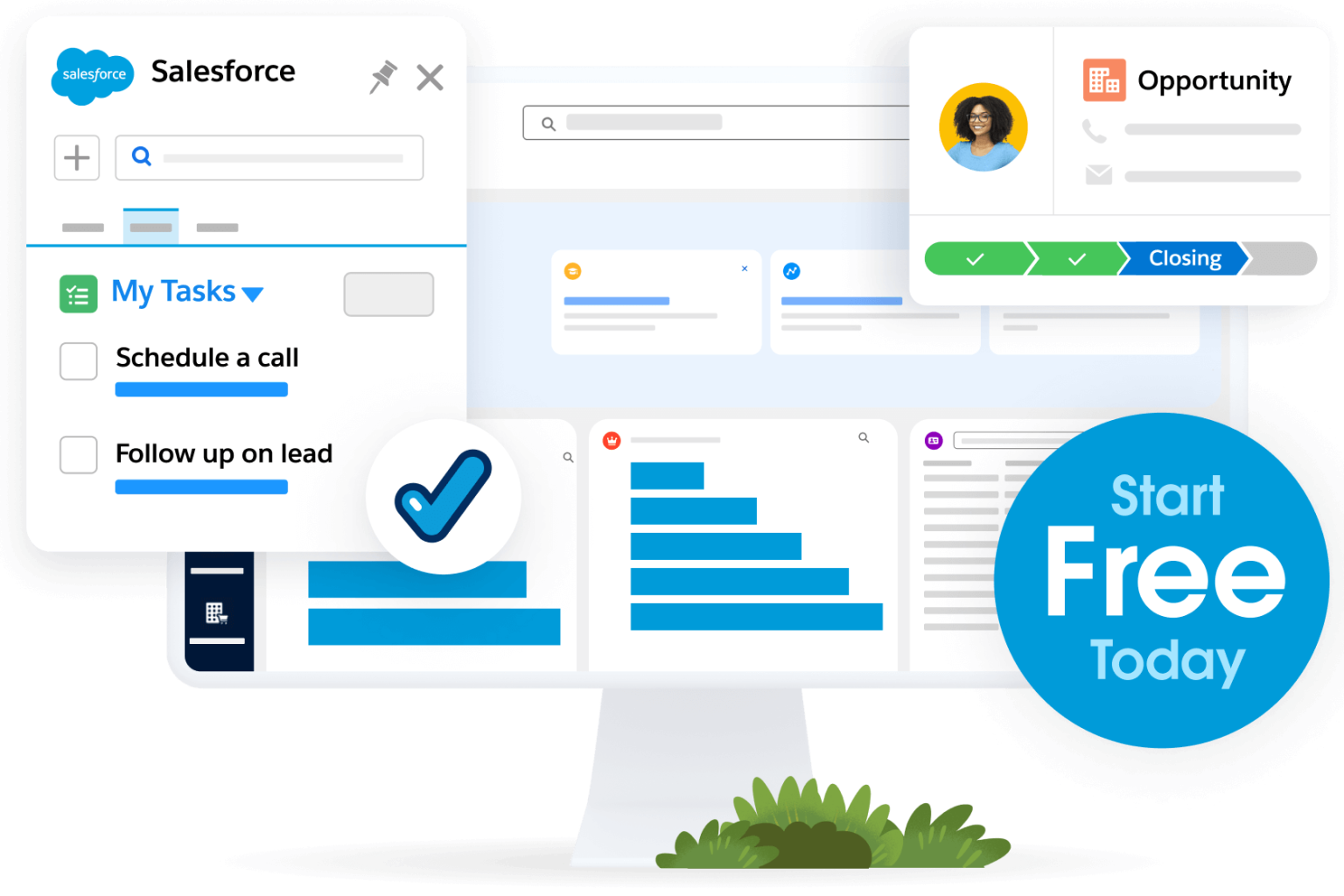
Examples of successful accelerators
Success leaves clues. Looking at established accelerators and their track records helps understand what’s possible when businesses find the right program match. These examples show how the right accelerator can provide the connections, mentorship, and resources that turn promising businesses into industry leaders:
Global Startups: Around the world, accelerators have helped launch companies that are now household names. Businesses like Airbnb, Dropbox, and Stripe all benefited from accelerator programs early in their development.
Y Combinator: Perhaps the most famous accelerator, Y Combinator has helped launch over 3,000 companies now valued at more than $300 billion collectively. Their alumni include DoorDash, Coinbase, and Instacart.
The Alchemist Accelerator: Focusing specifically on enterprise startups, The Alchemist Accelerator has helped B2B companies like LaunchDarkly and Rigetti Computing achieve remarkable success by connecting them with enterprise customers and investors.
Accelerating with AI and CRM
Smart technology has become a powerful accelerator, especially for startups that need to do more with less. Modern customer relationship management (CRM) designed for SMBs, help young businesses drive revenue, scale smartly, and build for long-term growth. Here’s how these solutions support the core priorities of a growing business:
Drive sales growth and revenue
Modern CRM platforms provide startups with enterprise-grade sales tools that track opportunities, automate follow-ups, and identify the most promising leads. This helps startups convert prospects faster and close more deals — addressing the number one priority of generating cash flow. AI analytics also identifies cross-selling and upselling opportunities within your existing customer base, helping you make the most of revenue from each relationship.
Grow Your Small Business With AI Agents
Learn how autonomous AI can scale your small business for efficient growth in our free e-book.
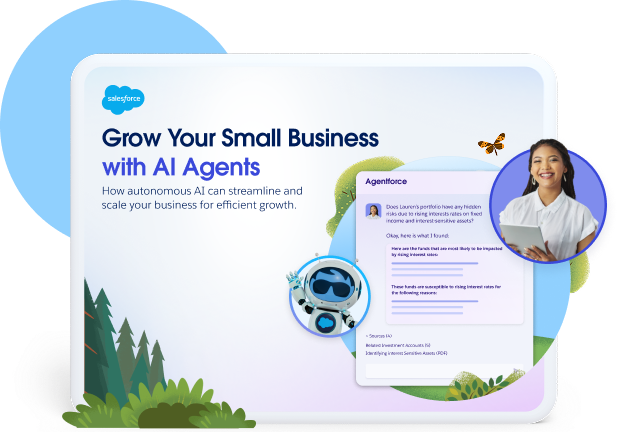
Make faster, data-driven decisions
Analytics tools give SMBs access to powerful data insights. These tools help with financial planning, business strategy development, and analyzing customer data to improve products and attract broader audiences. For startups, this means being able to quickly identify what’s working and where to invest limited resources for maximum return.
Amplify marketing and brand building
Good marketing starts with really knowing your customers. Smart CRM tools help you do just that by picking up insights from things like emails, social posts, and shopping habits. You start to see what people like, what they need, and how to talk to them in a way that actually clicks. AI-powered marketing platforms make it a whole lot easier.
These tools help you write content that sounds natural and fits your brand, whether it’s a social post, email, or campaign message. You can track what’s working, spot patterns, and even schedule posts when your audience is most likely to engage. It’s faster, smarter, and helps your brand show up in the right way, without burning out your team.
What can your growing business really do with a marketing CRM?
Ready to automate your marketing? It all starts with Starter Suite.

Hyper-personalize the customer experience
Small businesses often struggle to match the personalized service that larger organizations provide. AI applications like Agentforce and AI chatbots enable you to get more personalized. You can respond to inquiries quickly, follow up consistently, and maintain customer connections even with limited resources. This service builds trust and loyalty, turning one-time buyers into repeat customers who recommend you to others.
Since keeping existing customers costs less than finding new ones, this loyalty supports sustainable growth and long-term success.

Increase productivity
AI-powered CRM helps take care of repetitive tasks so you can stay focused on the work that moves your business forward. It handles things like data entry, follow-up scheduling, and routine communication automatically.
Customer information stays organized in one place, no more sorting through scattered emails or spreadsheets. You can check updates on the go and set reminders to stay on top of every interaction. For small teams managing multiple roles, this kind of support helps reduce errors and keep things running efficiently.
Collaborate with your team
Slack for small business enables seamless teamwork regardless of location. Your team stays connected while sharing updates and making decisions quickly—without endless emails or meetings. For businesses in accelerator programs, this rapid communication is vital. When working against tight deadlines and growth targets, you can’t afford bottlenecks. Ideas flow freely. Feedback arrives instantly. Iterations happen faster.
The platform organizes conversations by topic, creating a searchable knowledge base. New team members get up to speed quickly by reviewing channels, while integrations keep all your work in one place. This collaboration proves especially valuable during growth phases, keeping everyone aligned with your accelerating business goals.
Boost productivity with Slack for small business
Bring together your team, your customers, and your tools to help take your business to the next level.

Combine accelerators and CRM for instant growth
When you bring business accelerators, AI, and CRM together, you create something truly special for your businesses. These tools don’t just work well individually; they amplify each other. You get the mentorship and connections from accelerators, the smart automation from AI, and the customer insights from CRM all working together. This means your business isn’t just growing; it’s growing intelligently.
Your team gets more efficient while your customers actually feel more satisfied with your service. This combination lets you punch above your weight class. Suddenly, your small business can compete with much larger organizations because you’re using the same sophisticated tools they are, but you’re paying a fraction of what they pay.
Just get started.
No matter where you are on your journey as a small business, you can get started with Starter Suite — the all-in-one CRM for SMBs.

Accelerating your business in the digital age
Business is moving faster than ever. What used to take years now happens in months. Small teams with the right tools can compete, adapt, and grow like never before. That’s why combining the support of a business accelerator with the right technology isn’t just helpful; it’s necessary. Accelerators help you avoid the usual missteps with real guidance and support. Tools like Salesforce give you the power to move quickly, stay organized, and keep customers coming back. Your business is ready — make sure your tools are too.
Start your journey with the Starter Suite today. Looking for more customization? Explore Pro Suite. Already a Salesforce customer? Activate Foundations and try out Agentforce today.
AI supported the writers and editors who created this article.
Frequently Asked Questions (FAQs)
A business accelerator is a short-term, intensive program designed to help startups scale quickly. It offers mentorship, funding access, training, and resources to help businesses refine their models, grow faster, and connect with investors.
While incubators focus on early-stage idea development, accelerators work with startups that already have a product or traction. Accelerators are fast-paced, usually lasting a few months, and aim to get startups investor-ready.
Startups with a small team, a clear vision, and a working product or prototype are ideal candidates. If you’re ready to grow fast and open to mentorship and feedback, an accelerator can offer a valuable boost.
Many do. In exchange for resources and support, accelerators often ask for a small percentage of equity. However, some programs — especially government- or university-backed ones — may not.
Most programs end with a demo day where startups pitch to investors. After that, founders join an alumni network, continue to get support, and often raise funding or enter new markets with the momentum gained during the program.


